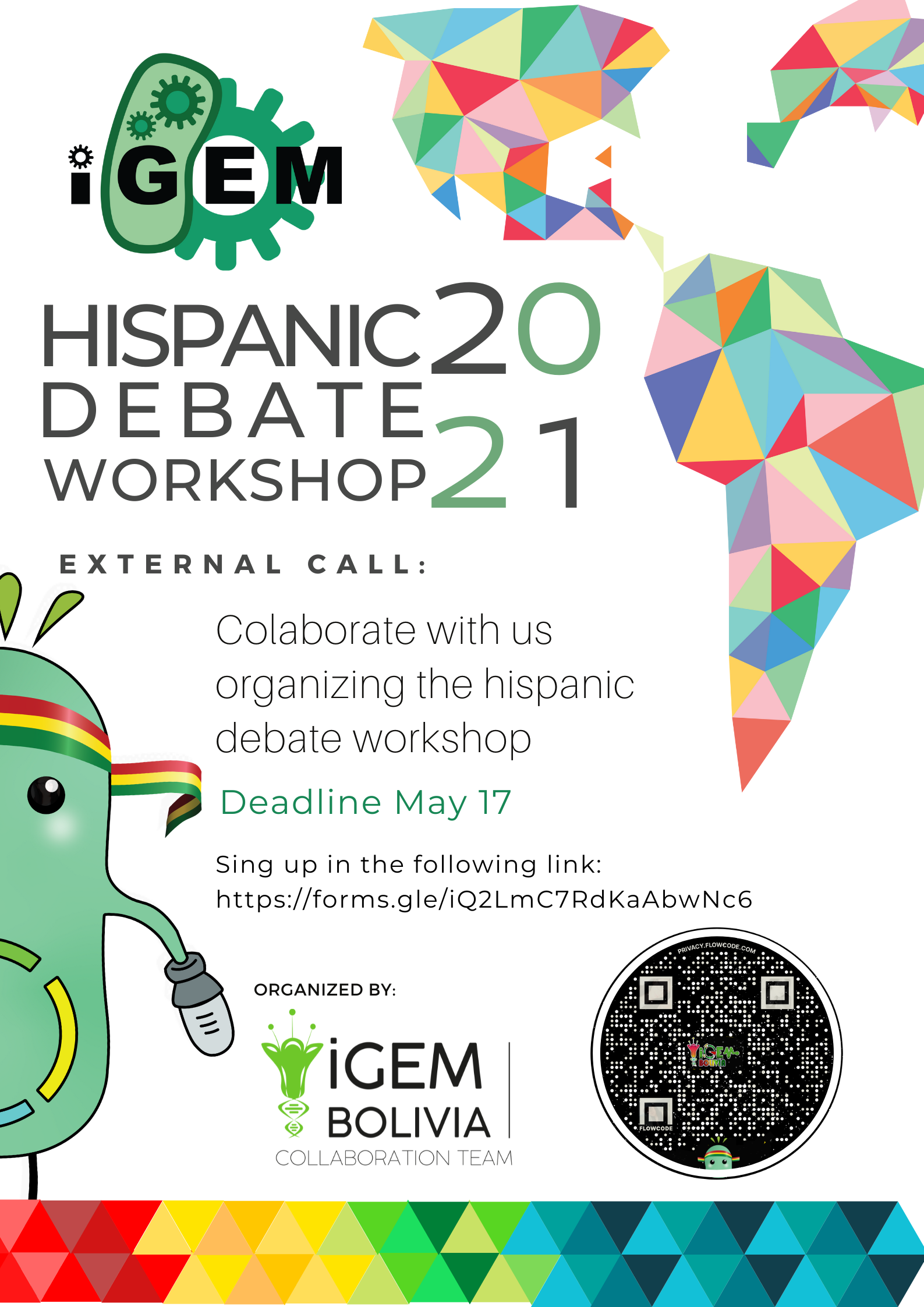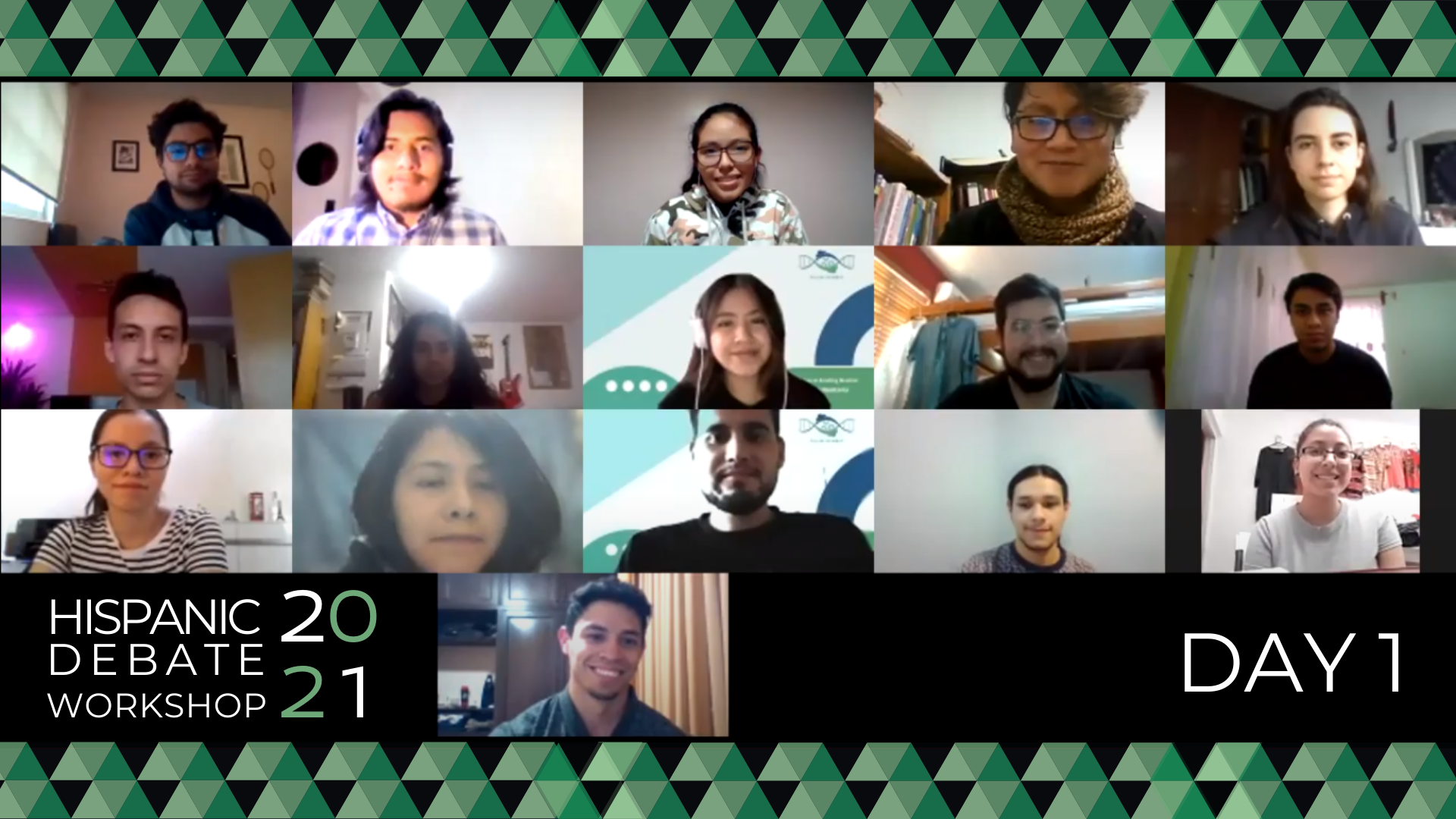OUR CREATIONS
Hispanic Debate Workshop 2021
MOTIVATION
iGEM Bolivia began after debates in 2020, where it emerged as a platform for handling controversial issues surrounding synthetic biology that would be amenable to supporting differing points of view. In the same year, some iGEMers learned techniques and tools necessary for debate thanks to the Debate School. We have already been able to organize an event at the Latin American level for 2021, where we shared knowledge acquired from the previous year. Teachers capable of running a workshop and other iGEM teams were invited so that young scientists could learn more about these tools and be able to interpret opposing thoughts in a more logical, collaborative and orderly way.
OBJECTIVE
The main objective of this activity was to encourage young people in Latin America to develop rhetorical and critical thinking skills conducive to analyzing controversial topics in synthetic biology, thereby enabling them to achieve higher order thought processes based on well-documented information.
ABOUT THE EVENT
To start with this great event, we required the help of other teams, who responded to our call and with whom we could work over a month to meet common objectives and communicate science differently through debate. iGEM Ecuador, iGEM FCB - UANL and iGEM UAM.
TEAMS



INSTRUCTORS

We began by holding three workshops in which all participants were able to interact and learn the necessary tools for a debate:
"Argumentation and Counter Argumentation" was taught by Antonio Zarate Ramos, who covered the bases of argumentation and dialectics. This workshop closed with a very dynamic and interactive activity where participants practiced what they had learned.
"Roles of Judges and Zigzag Format", taught by José Luis Feliciano Chipana, is a very important topic when it comes to participating as a judge or speaker in a debate. The segment ended with a mock debate in this format.
"If knowledge is controversial, do we debate?". Together with Gabriela Rivadeneira Caballero MSc. tutor of iGEM BOLIVIA, who spoke to us about how to convey our ideas regarding the position of an issue.
" ... we must notice the culture, be able to transmit scientific knowledge to a target group, we will see that knowledge becomes controversial and we have the challenge of being able to transmit this scientific knowledge in a friendly way.”
---Gabriela Rivadeneira Caballero MSc.
ABOUT THE TOURNAMENT
The Debate Tournament was held on Saturday 19th and Sunday 20th, June 2021, where a total of eight teams participated. From this first tournament we obtained the semifinalists who debated the following motions:
Should Synthetic Biology be restricted for the precaution of bioterrorism? iGEM Bolivia as affirmative and FCB-UANL as negative.
Is it ethical to use aborted human embryos for experiments? UAM participated as affirmative and SYNTHETIC BIOBOTS as negative.
GRAND FINALE
In this final event, we had two Mexican teams: iGEM UAM team represented by Andrea Sánchez and Angel Emanuel Martínez Flores and FCB - UANL team with Jorge Alberto Uribe and Julissa Janeth García, who debated for first place.
The debate allowed for a broad exchange of ideas, questions, rebuttal and defense of arguments between the two teams. The debate was quite intense and ended, declaring the FCB-UANL team the winner of the 2021 Hispanic Debate Tournament.This event was sponsored by Allbiotech, which awarded the winning team with a totally free course.
RESULTS
This activity could be seen thanks to iGEM TV for Latin America, where the impact of this event on the participating iGEMers was shown and where the winners also shared their experience. In addition, we inspire iGEM UAM to debate with radical movements, such as GreenPeace, to bring controversial issues around Synthetic Biology.
ORGANIZING TEAM AND SUPPORT TEAM
All this would not have been possible without the help of those who participated in this great event by contributing their ideas and time to make it a success.
Although the workshop and tournament lasted about a month, organization of the event took months of hard work. We thank the iGEM teams who dedicated many working hours, provided their social media platforms, helped us with the calendar and most of all provided us with an amazing workplace where we made new friends.
We also want to thank the speakers and judges who helped us supervise the event and always provided us with continuous feedback. Thank all the participants who gave their time selflessly to learn more about these types of tools and skills to defend their positions in a more informed way. Finally, we thank all of the iGEM Bolivia staff who helped us with the workshops, and in the collection of information throughout the event - they are exceptional people and we are truly grateful for them!
HANDBOOK "iGEM FOR BEGINNERS"
MOTIVATION
All teams participating in the iGEM competition know that building a solid project is a great challenge, especially when considering all items that must be covered and interconnected to satisfy requirements of the competition. This becomes increasingly difficult for first time participants in the competition. To alleviate these challenges, iGEM Bolivia has designed a guide for building a successful project that meets iGEM requirements. This is our contribution for the next generation of iGEM teams and the aim is to motivate more teams to participate in the competition. In our guide we describe the strategy that iGEM Bolivia used to build its project, which includes how to: allocate time; find the right people to lead the different areas; recruit students and volunteers who want to learn and communicate science, and design a project that has highly beneficial societal impact in both the local community as well as in those of other countries.
OBJECTIVE
The objective of this guide, “iGEM for Beginners”, is to help to form teams that will attend future iGEM competitions in an effective and efficient way by taking into account all of the steps that the iGEM foundation requires to win a gold medal.
EXPECTED OUTCOME
What can you find in the guide "iGEM for Beginners"? In addition to the strategy to build your team, this guide has advice, experiences and anecdotes that the current iGEM Bolivian team want to share with those considering their participation in the future. The adversities that future teams may encounter along the way will also be taken into account. We provide suggestions so that these future teams can solve problems that are likely to be encountered.
To overcome the language barrier, we think it would be very useful for the guide to be accessible in different languages. Since iGEM Bolivia is a new team, we ask the iGEM ambassadors to provide us with their feedback, as these tips are also intended to be part of the guide. We hope that the generated guide will become a valuable tool that imparts in a positive way to other iGEM teams of future generations.
HOW DID WE BUILD THE GUIDE?
We began by generating an outline for the guide based on the experiences shared with us by more experienced teams since iGEM Bolivia is a new team this year. We began by organizing meetings to share anecdotes and useful tips. This involved sending out a questionnaire to discover teams that were interested in helping us on our mission. After explaining the idea of building a guide to the interested teams, we then held meetings with eleven experienced teams that included Paris BME, NJU-CHINA, TEC-Costa Rica and Brazil, among others
These meetings were held in different languages (English, Portuguese and Spanish) to enable better communication with the teams. In these meetings we asked questions addressing past and present experiences on topics that included the significance of iGEM to each team, strategies for team assembly, and how to coordinate between different work areas (laboratory, human practices, integrated human practices, collaborations, scientific communication and wiki). Additionally, we received recommendations in each of these areas and also gathered information for fundraising ideas.
Each team provided very useful answers that were invaluable to start the process of writing the iGEM team guide. In summary, our conclusions from these meetings included: 1) It is necessary to organize time and comply with deadlines; 2) Communication within teams is essential to ensure a more productive work environment; 3) Taking initiative is required for iGEMers to be successful in designing a project that is likely to have high impact.
OUR PARTICIPATIONS
HOW WE STARTED?
Being our first participation, we decided to contact people who could guide our way within the competition, resolve our doubts and give us advice to carry out our ideas. That is why we turned to Heber Torres and Daniel Dominguez for advice.
INTERVIEW WITH HEBER TORRES
Heber Torres, Ambassador for Latin America for After iGEM, carried out a project on heavy metals in 2012; We met him and solved doubts about the competition, and the design of our arsenic biosensor. He gave us practical advice and the necessary bibliography.
INTERVIEW WITH DANIEL DOMINGUEZ
Daniel Dominguez, co-founder of AllBiotech, has vast experience in scientific divulgation and has seen many projects within iGEM. He helped us land our ideas for the Collaboration area projects and make it desirable to other iGEM teams.
COLLABORATION WITH iGEM UANL
The UANL team has been participating in this competition for 10 years. That is why they helped us to solve our doubts about participating in iGEM from the elaboration of the project to its presentation before the judges.
They were one of the teams with which we collaborated in the organization of the iGEM 2021 Hispanic Workshop and Tournament, their representatives obtained first place in the Tournament.
We were able to collaborate in one of their "Fire Detective" activities, where we were able to talk about the impact of our small actions on forest fires and we also talked a bit about our culture and the day to day life of iGEM teams in Latin America.
COLLABORATION WITH WATERLOO iGEM
We had the opportunity to communicate with this Canadian team, which already participated in the iGEM competition in past years (2014-2021) presenting a project related to heavy metals that pollute water, REMINE.
In the first meeting we were able to talk about the different areas of work we have in iGEM, with the aim of dispelling doubts and asking for some advice to continue with the work. With this meeting we were able to learn more about the project presented and how to solve some difficulties that we had and were similar to this team.
In the second meeting, we had the ¨wiki¨ section of both teams, since last year they won the Best Wiki category. The team chose to ask pertinent questions to do a good job on our wiki. Waterloo gave us useful answers along with their experiences and advice.
COLLABORATION WITH iGEM DÜSSELDORF
With iGEM Düsseldorf we were able to generate a collaboration by making a card that reflected our work. Despite suffering some mishaps in sending our cards, we were able to share our work with other teams around the world and also receive the cards back virtually. It was exciting to have been one of the few teams from Latin America to be able to participate and share our project with more teams.
COLLABORATION WITH iGEM PATRAS
iGEM Bolivia, along with many other teams, participated in the activity organized by iGEM Patras. This activity was held in commemoration of women scientists. For this we had to choose a representative scientist for our team, it was Rosalind Franklin. In addition, we share photos of the iGEM Bolivia women's team.
Undoubtedly, this activity allows us to highlight the importance and impact that women have in science, so we did not hesitate to collaborate in this activity.














































































